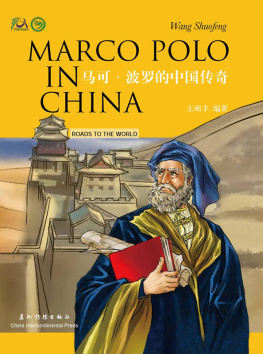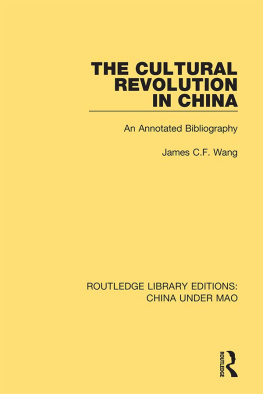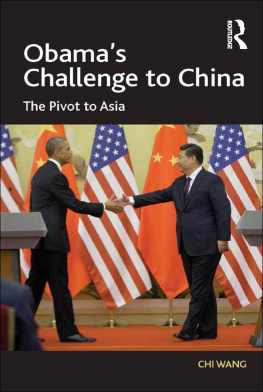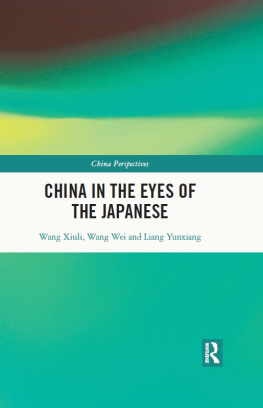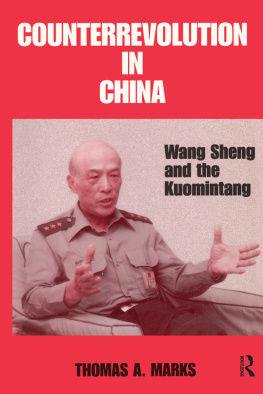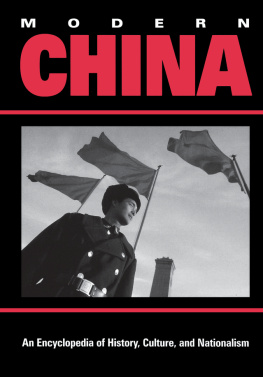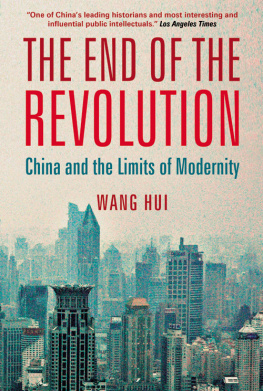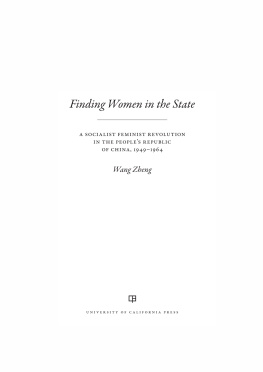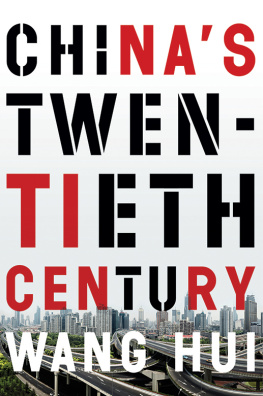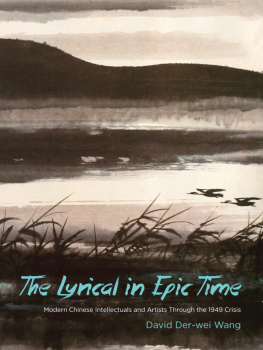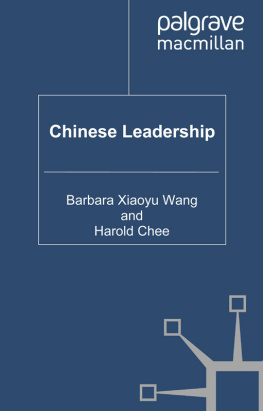
Gender, Dating and Violence in Urban China is a tour de force. With a passionate feminist eye, Xiying Wang lays out the everyday, seemingly trivial forms of violence that infuse heterosexual dating relationships in urban China today. Her complex analysis demonstrates how everything from the ongoing rapid socio-economic transformations in China, changing gender and sexual norms and ideals, the often inseparability of love and violence, and gender inequality in China fuel dating violence. A well written, well researched study that will inspire a public conversation.
Lisa Rofel, Professor, Department of Anthropology, Co-Director, Center for Emerging Worlds, University of California, Santa Cruz, US
In this courageous and important book, scholar-activist Xiying Wang, a pioneer in the study of dating violence in China, takes us inside the intimate relationships of young Chinese to see the dark underside of the nations celebrated romantic revolution. Through first-hand portraits of sassy girls, tender boys, and other surprising subjects, she challenges the myths surrounding Chinese sexuality, offering a theory of Chinese intersectionality to explain how individuals navigate their sexual worlds. In charting the human costs of Chinas unfinished gender and sexual revolutions, Wang delivers what is at once a compelling academic study and a feminist call to action.
Susan Greenhalgh, Professor, Department of Anthropology, Harvard University, US
Gender, Dating and Violence in Urban China
This book explores young peoples experiences of, and views on, dating, gender, sexuality and violence within dating relationships. Based on interviews and focus groups conducted in Beijing over a long period, and focusing especially on dating violence, the book reveals insights on a wide range of issues of gender and sexuality in contemporary China. It shows how young Chinese peoples attitudes and behaviors are changing as urban China develops rapidly, and how their experience of dating violence and meaning-making process are affected by age, gender, location and class.
Xiying Wang is an Associate Professor in the School of Social Development and Public Policy at Beijing Normal University, China.
Routledge Culture, Society, Business in East Asia Series
Editorial Board:
Heung Wah Wong (Executive Editor), The University of Hong Kong, Hong Kong, China
Chris Hutton, The University of Hong Kong, Hong Kong, China
Wayne Cristaudo, The University of Hong Kong, Hong Kong, China
Harumi Befu (Emeritus Professor), Stanford University, USA
Shao-dang Yan, Peking University, China
Andrew Stewart MacNaughton, Reitaku University, Japan
William Kelly, Independent Researcher
Keiji Maegawa, Tsukuba University, Japan
Kiyomitsu Yui, Kobe University, Japan
How and what are we to examine if we wish to understand the commonalities across East Asia without falling into the powerful fictions or homogeneities that dress its many constituencies? By the same measure, can East Asian homogeneities make sense in any way outside the biases of East-West personation?
For anthropologists familiar with the societies of East Asia, there is a rich diversity of work that can potentially be applied to address these questions within a comparative tradition grounded in the region as opposed the singularizing outward encounter. This requires us to broaden our scope of investigation to include all aspects of intra-regional life, trade, ideology, culture, and governance, while at the same time dedicating ourselves to a complete and holistic understanding of the exchange of identities that describe each community under investigation. An original and wide ranging analysis will be the result, one that draws on the methods and theory of anthropology as it deepens our understanding of the interconnections, dependencies, and discordances within and among East Asia.
The book series includes three broad strands within and between which to critically examine the various insides and outsides of the region. The first is about the globalization of Japanese popular culture in East Asia, especially in greater China. The second strand presents comparative studies of major social institutions in Japan and China, such as family, community and other major concepts in Japanese and Chinese societies. The final strand puts forward cross-cultural studies of business in East Asia.
First published 2017
by Routledge
2 Park Square, Milton Park, Abingdon, Oxon OX14 4RN
and by Routledge
711 Third Avenue, New York, NY 10017
Routledge is an imprint of the Taylor & Francis Group, an informa business
2017 Xiying Wang
The right of Xiying Wang to be identified as author of this work has been asserted by her in accordance with sections 77 and 78 of the Copyright, Designs and Patents Act 1988.
All rights reserved. No part of this book may be reprinted or reproduced or utilised in any form or by any electronic, mechanical, or other means, now known or hereafter invented, including photocopying and recording, or in any information storage or retrieval system, without permission in writing from the publishers.
Trademark notice: Product or corporate names may be trademarks or registered trademarks, and are used only for identification and explanation without intent to infringe.
British Library Cataloguing in Publication Data
A catalogue record for this book is available from the British Library
Library of Congress Cataloging in Publication Data
Names: Wang, Xiying, author.
Title: Gender, dating and violence in urban China / Xiying Wang.
Description: 1 Edition. | New York : Routledge, [2017] | Series: Routledge culture, society, business in East Asia series ; 5 | Includes bibliographical references and index.
Identifiers: LCCN 2016058077| ISBN 9780415810333 (hardback) | ISBN 9781315170350 (ebook)
Subjects: LCSH: Dating violenceChina.
Classification: LCC HQ801.83 .W36 2017 | DDC 362.88dc23
LC record available at https://lccn.loc.gov/2016058077
ISBN: 978-0-415-81033-3 (hbk)
ISBN: 978-1-315-17035-0 (ebk)
This book is dedicated to my parents, Wang Wenjun and Ji Xiuying, in appreciation of all the values they taught that have made me the woman I am.
It seems that this book project has taken forever to finish, and I feel extremely happy to write the acknowledgements, close the project and express my gratitude for the many forms and sources of support during the long and sometimes difficult writing process.
I would like to thank all informants who participated in individual interviews or focus groups and shared their experiences, opinions, and stories generously with me. Without their support, this book could not have been produced, although their names must remain anonymous.
Over the decade, certain professors have been my mentors during different periods. I owe a debt of gratitude to my PhD supervisor, Professor Sik Ying Ho, who took over the supervision of my research at the most difficult moment in my PhD journey. Her critical thinking and academic passion have inspired me in becoming a Chinese feminist. Her stimulating teaching and theoretical interrogation have enlightened me to be a good researcher and teacher. I got to know Professor Ada C. Mui at Columbia University in 2006, and ever since then I found that she was always available when I reached out for help and needed emotional support or academic advice. It is my good fortune to have known Professor Joshua Miller, who became my mentor, colleague and dear friend, at Smith College ever since 2008. He helped me recover from compassion fatigue, we co-taught a course together, and he gave me much insightful feedback on all sorts of my written texts, including this book. I met Professor Manfred Henningsen from the University of Hawaii at Manoa at a conference in Hong Kong in 2010 and we became reliable friends. His perspective as a political scientist always gives me different, enlightening approaches to understanding the social phenomenon that I have been studying. In 2014, I was fortunate to be accepted as a CSCHarvard postdoctoral fellow under the supervision of Professor Susan Greenhalgh at Harvard University. Sitting in her classes on Biopolitics and Women and Bodies, reading her books (



